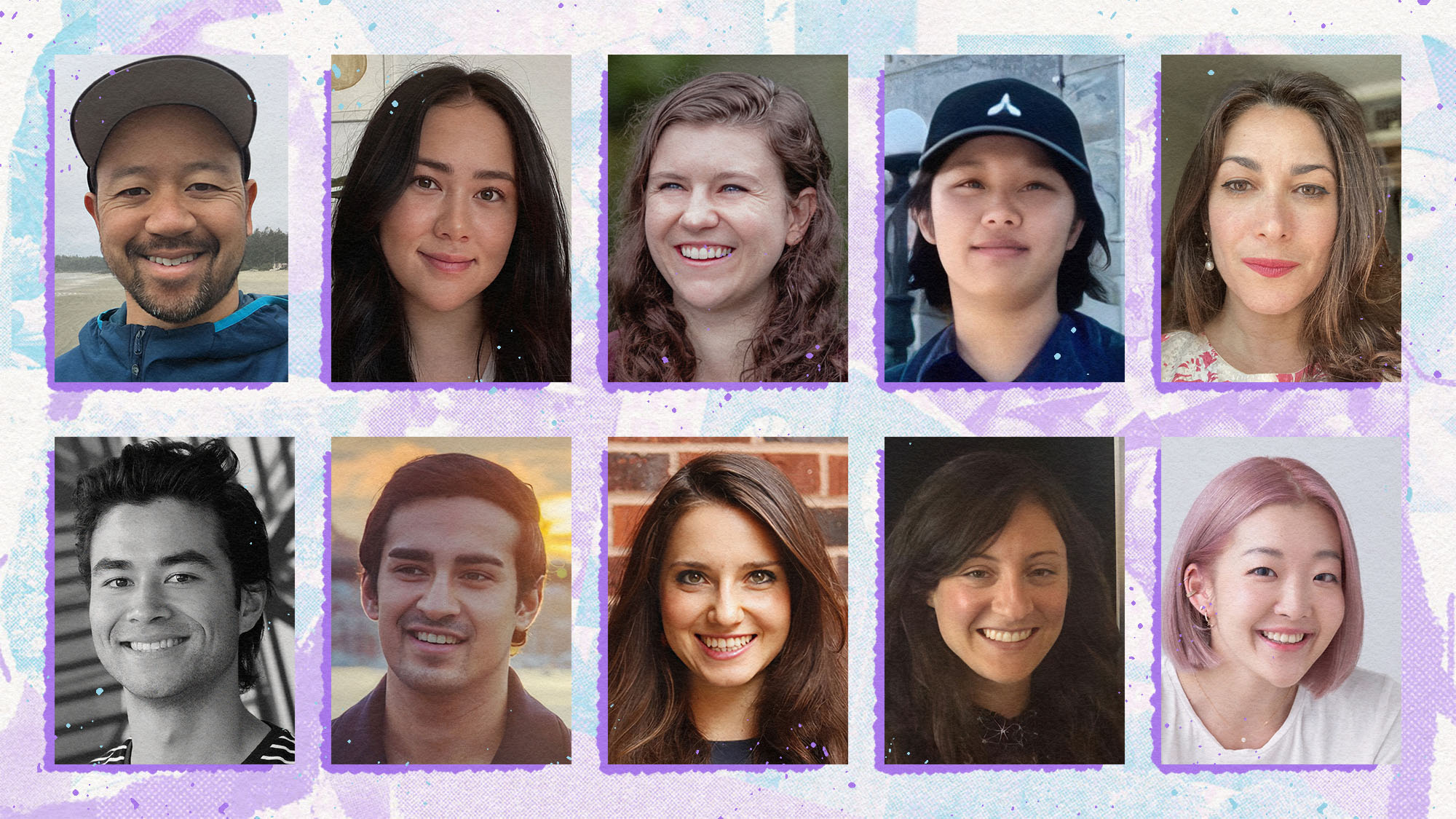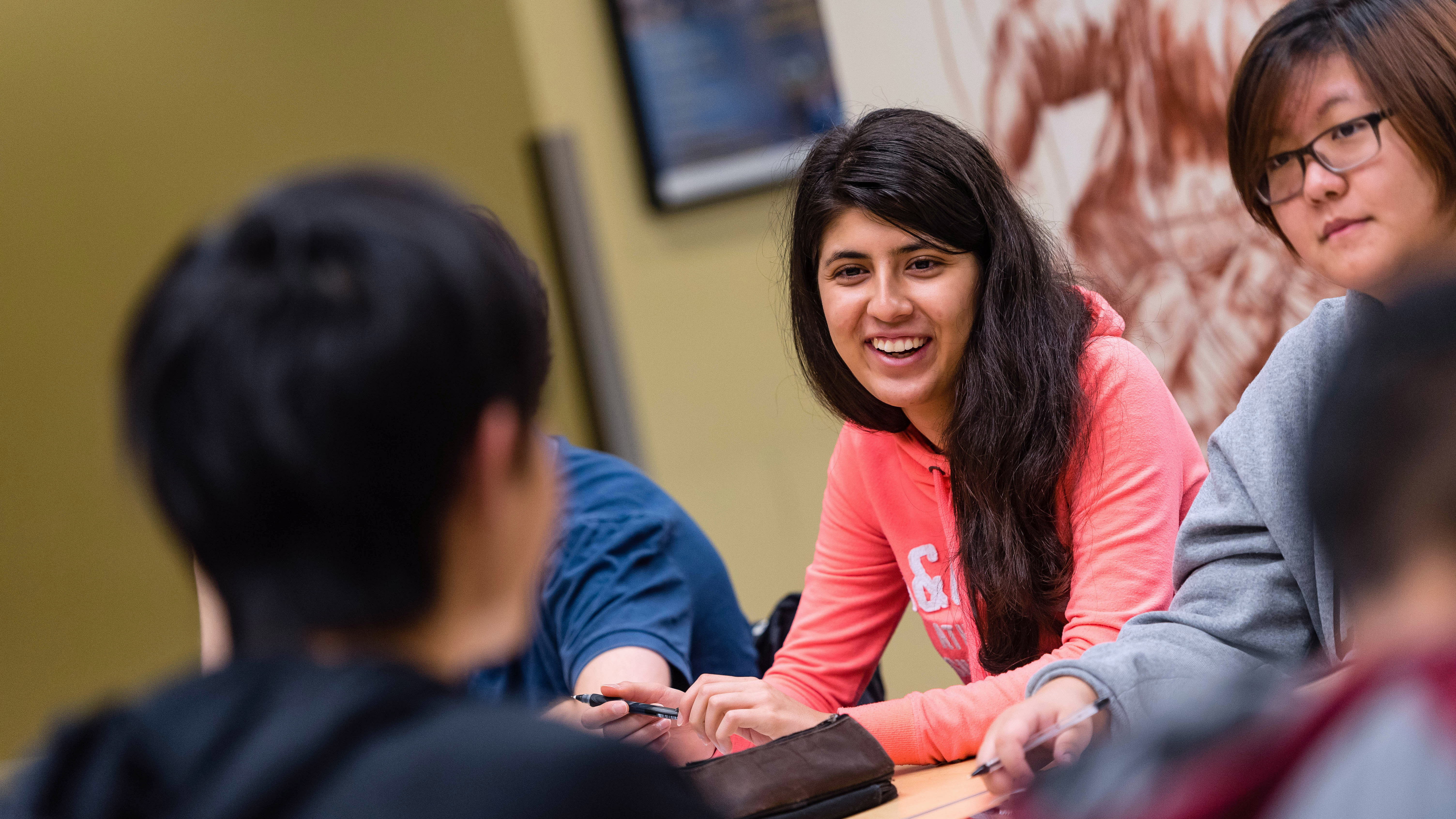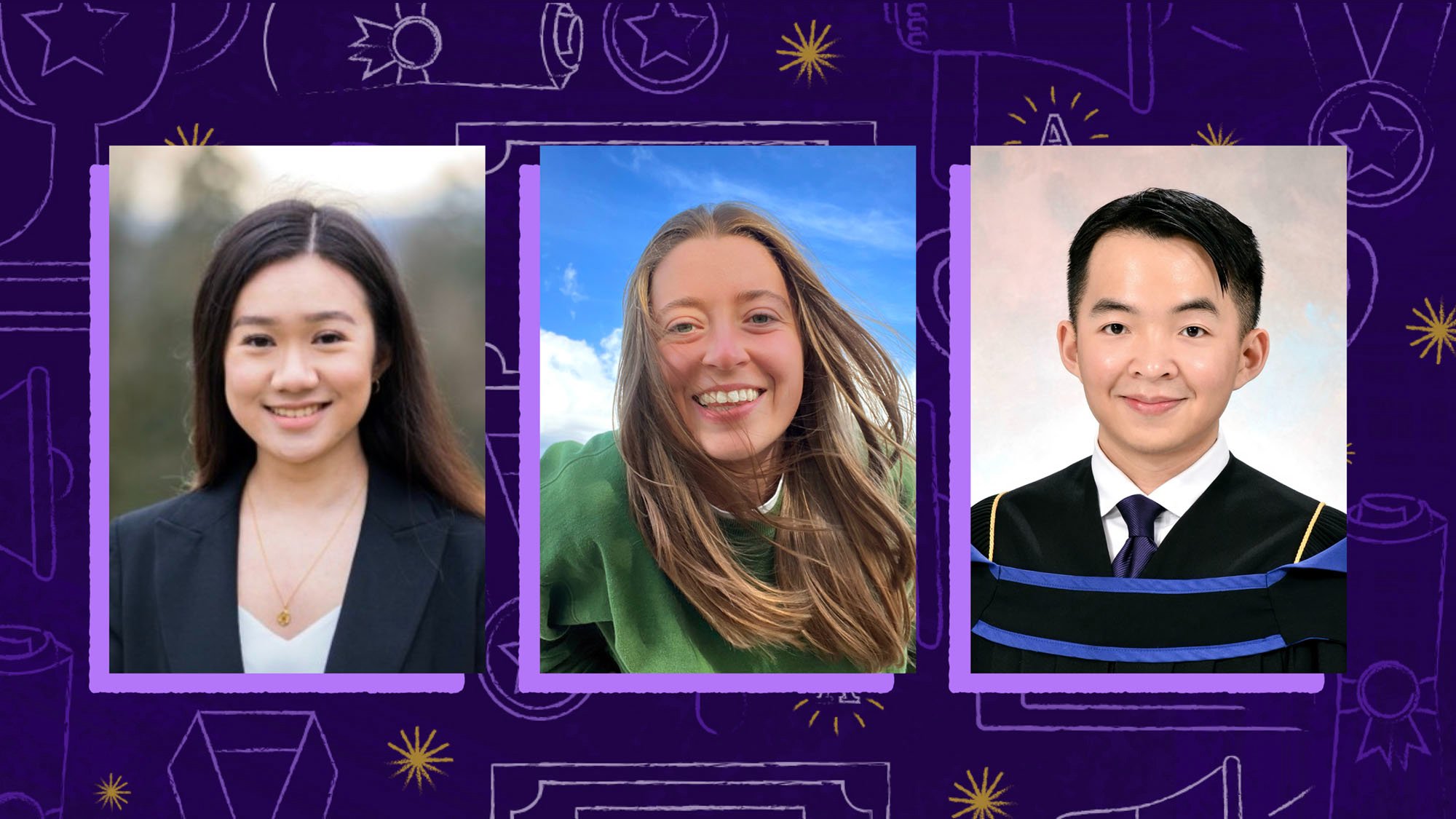

Viola Chao, Alancia Jeffery, and Kenneth Lao are recipients of the 2024 Outstanding Leader in the UBC Community Award for their commitment to shaping positive communities and healthy campus cultures at UBC.
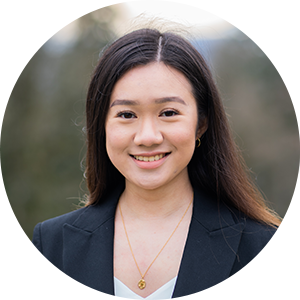

Viola Chao, Psychology
Viola facilitated the creation of the BIPOC Committee within the Arts Undergraduate Society (AUS), embedding principles of Equity, Diversity, and Inclusion (EDI) in all areas of academic, work, and campus life.
She provided academic and wellness support in various campus hubs including UBC’s Wellness Centre and Alma Mater Society.
What student leadership opportunity had the most impact on you during your time at UBC?
My four years as a part of the AUS will always hold a special place in my heart. Joining the Health & Wellness Committee, I eventually went on to serve as Vice-President Academic. I discovered my passion for promoting and advocating health and well-being for equity-seeking communities, particularly through facilitating wellbeing and academic support initiatives aimed at enhancing the Arts student experience. Education is a powerful tool in approaching EDI, which is why my work in spearheading the creation of a BIPOC Committee was especially meaningful as it set the groundwork for creating opportunities for my peers to explore BIPOC advocacy and foster an equitable culture in the Faculty of Arts. Many of the perspectives I’ve gained through the AUS have extended towards my time with the AMS, UBC Wellness Centre, Faculty of Applied Science Professional Development Team, and the Asian Canadian Asian Migration (ACAM) program.
What does it mean to be a great Arts student leader?
There aren’t homogenous definitions of a great Arts student leader. Every student has something valuable to contribute to our community. I strongly believe that keeping an open mind and actively learning from those around you can foster personal growth and expand your perspectives. What has driven my leadership work over the years is my dedication to understanding gaps that we can tangibly fill, while reflecting on how we can collectively do better to meet student needs. Good leadership involves actively considering your access to privilege and your position within social hierarchies. It’s important to reflect on how you could play a role in holding space and uplifting marginalized voices.
What advice would you give to incoming UBC Arts students?
Don’t be afraid to step outside your comfort zone! It’s totally okay if you don’t stick to the plan you may have envisioned or built for yourself. For instance, I discovered my love for ACAM courses late in my degree, which made me wish that I offered myself more flexibility to explore different elective courses, especially during my first and second year. Some of the greatest things that have happened to me at UBC have come spontaneously and unexpectedly!
What did you learn about yourself at UBC?
I’ve realized over the years, work surrounding EDI can be incredibly emotionally laborious, especially because there were times when I felt a sense of responsibility to make a positive impact as a racialized student who had access to these leadership opportunities. As much as I’ve learned my capabilities in channelling my character as an empath towards enacting social change, I’ve also navigated significant periods of burnout and come to know how important it is to meet myself where my mental capacity sees fit. A fundamental aspect of self-empowerment involves actively practicing self-compassion, and acts of self-care can look different depending on the season of life you’re in. I’ve found it helpful over the years to maintain balance by slowing down and checking in on my emotional needs.
What message do you have for your graduating peers?
To my fellow graduating peers, congratulations on achieving this incredible milestone! It’s easy to lose ourselves in our worries about the next chapter of life without realizing that we have reached a time that our past selves have looked forward to, so I hope you can take the time to commend what your perseverance and dedication have brought you. Celebrate the person you have grown into today and take everything you’ve gained from your time at UBC to continue growing into the best version of yourself. I wish you all the best in all of your tomorrows.
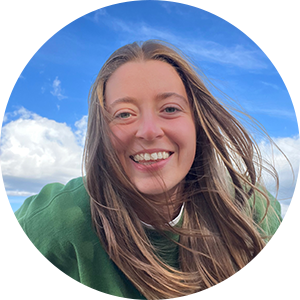

Alancia Jeffery, History
A recipient of the U-Sport Academic All-Canadian Award 2022–2023 and an active member of the UBC Women’s Rugby Team, Alancia demonstrated exemplary contributions to the athletics culture at UBC. Providing academic mentorship support to other student athletes within the broader UBC community, Alancia exemplified the importance of maintaining a healthy academic career while finding meaningful extracurricular engagement.
What student leadership opportunity had the most impact on you during your time at UBC?
My time as a Varsity Team Academic Coach (VTAC) at UBC was the most impactful leadership experience. In this role, I worked with various varsity teams and gave one-on-one support to student-athletes, helping them set goals, offering study tips, and making sure to be there as needed. I was able to meet people of various backgrounds, goals, and experiences which I will always hold close to my heart.
What does it mean to be a great Arts student leader?
A great Arts student leader is a unique honour because it looks different for everyone depending on personal interests, your specific program, and passions. Yet, all great leaders understand the importance of inclusivity, ensuring that everyone is valued and heard. Therefore, a great Arts student leader will push themselves to engage in UBC’s community while creating a welcoming and inclusive environment for others to do the same.
What advice would you give to incoming UBC Arts students?
Engage in opportunities at UBC that are outside of academics, such as Recreation intramurals, WorkLearns, attending varsity games, pop-up events such as craft fairs, thrift stores, and more. There are so many opportunities to make friends, form connections, and grow individually by trying new things and making time to balance academics and extracurriculars.
What did you learn about yourself at UBC?
I learned the importance of balancing academics and extracurriculars. It is very easy to get caught up in your individual life, but I learned that life does not stop around you even when you’re busy. By balancing what you love and what you need to do as a student, you’re rewarded with opportunities to meet people, have fun, and figure out the type of impact you would like to make, I know I did.
What message do you have for your graduating peers?
Congratulations on your hard work, resilience, and commitment. We made it! Each of us contributed to building UBC’s community, and we should be proud of our achievements, both as individuals and as a Class. Let’s not forget to pause and thank ourselves, our loved ones, and our support networks. Remember, this is just one part of our journey towards even greater things!
Kenneth Lao, Honours in Sociology
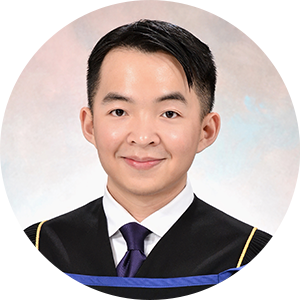

As Co-President of the Sociology Students’ Association (SSA), Kenneth launched an inaugural SSA Director’s program which advocated for more available and accessible leadership opportunities for a wider reach of students.
His contributions in providing catered mentorship and equipping students from an array of programs ranged from the Arts Co-op Student Association (ACSA) to Arts Peer Academic Coaching (APAC).
What student leadership opportunity had the most impact on you during your time at UBC?
Serving as Co-President of the SSA has made the most direct impact on me. I started out at the SSA initially as a volunteer, then the next year I took on the executive role of Vice-President Communications, and eventually became Co-President the year after. During my three-year run working with the SSA, I was able to grow with the organization, introduce and implement new ideas, but most importantly, challenge myself. I also relish the joy in connecting students to opportunities and resources. My previous experience as a Teaching Assistant for a 100-level class has led me to see the hunger and fire in students to explore avenues that expand their networks and skillsets.
What does it mean to be a great Arts student leader?
My success is not by any means independent or self-made. Rather, it is a testament to the legacy and lineage of student mentors who have paved the way and inspired me in so many profound ways. For example, I met former Co-President of the SSA, June Lam, during my graphic design volunteer position at the SSA. My friendship and mentorship with June grew during the pandemic. It later led her to vouch for me, sponsor me, and recommend me to Dr. Silvia Bartolic, where I worked alongside June to coordinate several qualitative research projects and presented them at international academic conferences. Witnessing June’s leadership and her precision and confidence during my time working with her inspired me to similarly strive for perfection. As both first-generation university students ourselves, we proved that greatness beyond the minimum is possible, and we are capable of anything as long as we set our minds to them. In setting herself as an example, I was encouraged to push myself beyond my comfort zone and dive headfirst into unfamiliar territory.
What advice would you give to incoming UBC Arts students?
I would recommend getting involved in student associations as early as possible in your undergraduate career. Joining the SSA and ACSA has not only allowed me to network with senior students and learn from their pathways but has also reinforced my existing friendships with peers. Lulu Wang, my Co-President, has been a particularly dear friend of mine. When I faced difficulty landing my first co-op internship, Lulu did not hesitate to pass my name on to her supervisor at the U.S. Consulate, who was looking for an additional student intern at the time. Her help allowed me to network with accomplished diplomats at the Consulate, who later became important references for my graduate applications and even gave Lulu and I a tour of the U.S. Department of State when we visited Washington, D.C. this year.
What did you learn about yourself at UBC?
I learned a lot about vulnerability and how integral it is to my approach to leadership. Being the President of a student-run organization that represents students from all walks of life was no easy feat. As President, I have been misunderstood, made mistakes, and unintentionally caused conflicts myself. Looking back, I see the ways in which my vulnerability has enabled me to cultivate an honest and safe organizational space for conflicting viewpoints to coexist and subsequently, for the soundest decisions to emerge. In being transparent, taking accountability, and handling conflicts as humanly possible, my vulnerability did not cloud my judgment as one might assume. It expanded my powers as an empath and allowed me to actualize my leadership vision in a manner that was both accountable and inclusive. My ability to navigate team differences while remaining vulnerable and honest with them is something I take pride in and wish to carry with me into future organizations.
What message do you have for your graduating peers?
To my graduating peers, you have done exactly what you need to do to get to this point in your life. I hope you look back on this moment and feel proud of how far you have come and the many unseen battles that only you—of all people—know how hard you have fought. While the future can seem daunting and the past can sometimes evoke regret, I hope you remember that the present is the only variable you can actively control and change. So, I ask that you always live in the moment, make memories, and, as Taylor Swift puts it, speak now rather than later.
